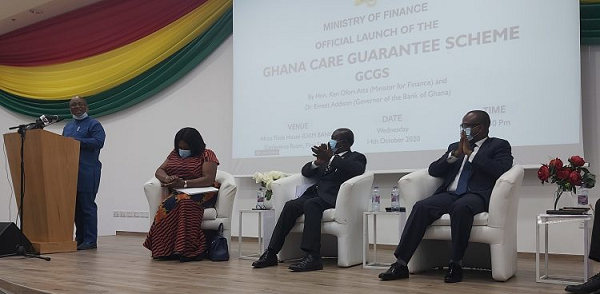
Govt unveils GH¢2bn credit guarantee scheme for SMEs
The government has launched a GH¢2 billion guarantee scheme to support universal banks in the country to offer financial support to small and medium enterprises (SMEs) for them to recover from the COVID-19 shocks.
The Ghana Care Guarantee Scheme (GCGS), to be administered by the Ghana Incentive-based Risk-sharing System for Agricultural Lending (GIRSAL), is to help SMEs to borrow from banks at lower rates and with longer tenor.
The GIRSAL is a non-bank financial institution incorporated as a private company by the Ministry of Finance, with seed funding from the Bank of Ghana (BoG) and the African Development Bank (AfDB).
The GCGS will guarantee up to 80 per cent of the credit extended by participating banks to their clients.
Targets
Launching the initiative in Accra, the Minister of Planning, Professor George Yaw Gyan-Baffour, explained that under the initiative, the government had targeted specific industries within the agri-business, manufacturing, hospitality and tourism and technology sectors, among others.
The minister, who performed the launch on behalf of the Minister of Finance, Mr Ken Ofori-Atta, said the government was doing that, among a number of things, for the private sector because it was aware of the impact of the COVID-19 on their businesses.
In attendance were captains of industry and chief executives of various universal banks in the country.
Prof. Gyan-Baffour added that the government was also doing that with the knowledge that the SMEs were the backbone of the economy, since they represented about 85 per cent of businesses and contributed about 70 per cent to Ghana’s Gross Domestic Product (GDP).
Employment
He noted that enterprise accounted for an overwhelming proportion of employment in the country, and that was the reason the government had set aside that amount to help SMEs undertake the necessary adjustments to survive the impact of the pandemic.
He said it was the expectation of the government that the targeted SMEs would take advantage of the scheme to inject critically needed funding into
their operations, adding: “We expect that this will enable them to sustain jobs and contribute to economic growth and recovery.”
Progress
Tracing the economic trajectory prior to the pandemic, Prof. Gyan-Baffour said under President Nana Addo Dankwa Akufo-Addo, Ghana’s economic fortunes had been reversed substantially for the better: macroeconomic stability had been restored, the government had invested heavily in human capital and placed it on a path of sustained transformation.
He added that even under the strains and stresses of the COVID-19 pandemic, most of the key indicators on the economy had remained comparatively commendable and were in a better position to support quick recovery.
“Under the stewardship of this government, economic growth rate has rebounded strongly from 3.4 per cent in 2016 to an average of seven per cent by December 2019; headline inflation remained stable at 10.5 per cent as of August 2020, as against 15.49 per cent in 2016,” he said.
COVID-19 interventions
Prof. Gyan-Baffour said the government, recognising the devastating impact of the COVID-19 on businesses, advanced support to micro enterprises under the GH¢600 million Coronavirus Alleviation Programme Business Support Scheme (CAPBuSS).
He said the Akufo-Addo administration had prepared a comprehensive and audacious programme to support the recovery and revitalisation of Ghanaian enterprises in the medium term.
Collateral
The First Deputy Governor of the BoG, Dr Maxwell Opoku-Afari, was of the firm belief that the guarantee scheme under the Ghana CARES programme would go a long way to reduce the risk perception of SMEs, help reduce their cost of borrowing and increase access to appropriate financing to them.
He said that, in turn, should enable them to produce more to meet local demand and provide decent livelihoods for households that depended on them.
Dr Opoku-Afari explained that a unique feature of the Ghana CARES programme was that it was being done through the provision of guarantees, instead of cash handouts, and was less distortional to both the financial system and beneficiaries’ sustainability, going forward.